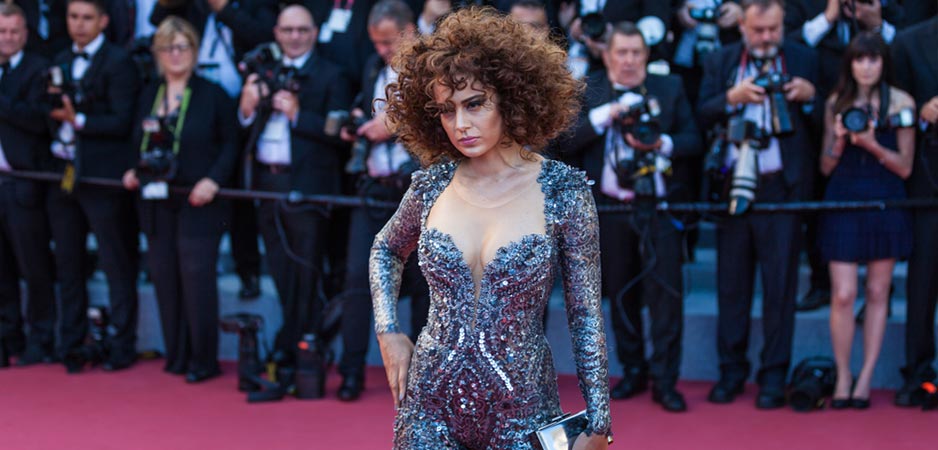Indian attitudes toward sex are misogynistic and hypocritical.
In January, an interview with Sunny Leone, a Canadian-Indian actress and producer, by seasoned journalist Bhupendra Chaubey took India by storm. Before becoming the Bollywood star she is today, Leone worked in the adult entertainment industry in the United States. Now, she commands an impressive fan following in India and was the most Googled person of the year in 2015, surpassing Indian Prime Minister Narendra Modi.
The Interview
The interview’s main focus appeared to be soliciting some sort of regret and emotional breakdown from Leone. Chaubey started with a cryptic inquiry of her name and asked if it was OK to call her Sunny—a name she gave herself when she ventured into the entertainment industry and the only name she is referred to by. It seemed he wanted to elicit some long-lost nostalgia about her innocent childhood, and how she misses the person she was before—the person named Karanjit.
Chaubey grilled the Bollywood actress on the regrets she may have professionally, assuming that if one decides to work in the porn industry it must be because they were forced to do so. In a definitive Indian style, he was looking for a sob story that would validate Leone’s decisions.
It is difficult for Chaubey—and surely for many Indians—to fathom how a girl could, under no obvious pressure, resort to working in the adult film industry when so many of us cannot even utter the word “sex” with ease.
Indian women are supposed to be non-sexual beings and hide from the very suggestion of the act. Allegations were hurled at Leone under the garb of “public curiosity,” and she was accused of increasing the public demand for pornography in the country and ruining marriages.
It was amusing to watch Chaubey first refer to housewives, and then quickly change his statement to women in general as being scared of Leone. It seems as if his view of women is one of meek housewives stuck at home, watching television and dreading the day their husbands decide to explore greener pastures.
The most shocking part of the conversation occurred when Chaubey asked Leone if he was being morally corrupted just by talking to her.
Sunny Leone refers to herself as a woman who just wants to work and as someone who is glad to have a job she loves, but Chaubey wondered if having work only mattered because of money and if she saw her career from a more artistic standpoint. He asked if a Bollywood superstar like Aamir Khan would want to work with her, reinforcing the stigma attached to her past. The former porn star was poised and unapologetic, saying that her past is what has got her to where she is now, and she would gladly make the same decisions again, simply because it had made her successful and independent.
It was tortuous to see a senior journalist reinforce his prejudices with such maliciousness on national television. Had it been the Bollywood superstar Shahrukh Khan, it is unlikely that Chaubey would have found the guts to ask him such controversial questions. Tusshar Kapoor, an Indian actor who has starred in many adult Bollywood comedies, has never been subjected to such questioning. Was it easier to throw mud on an independent woman sans any nepotistic connections in Bollywood?
Being a porn star is not a pitiable condition to be in. It can be a place where women feel extremely comfortable with their bodies and sexuality. Working in the adult entertainment industry may not be what a child aspires to, but it has certainly become a valid career option for adults. Sunny Leone says that when she met the agent and saw pictures of other women, she didn’t think of them as haunted and oppressed, but saw them as bold, sexy and beautiful. People make varied choices in life and no one should be blamed for their decisions.
Leone recently said in another interview that she felt alone and upset during Chaubey’s interrogation. The Indian journalist felt entitled to ask such personal questions, because he considered her to be less of a human being due to her past and refused to congratulate the actress on her professional success in the film industry.
Misogyny, Chauvinism and Hypocrisy
Bollywood is known to be misogynistic. Movie plots often revolve around the male hero, and actors experience gender discrimination with their salaries. If the Bechdel Test was to be applied to Bollywood movies, 99% of them would fail.
This only forms a small part of the larger discriminatory practices in Indian society. According to Pornhub’s insight report for 2015, India came third in global traffic to the pornography site, after the US and Britain. Interestingly, Indian women were the third highest consumers of porn, second only to the Philippines and Brazil.
Incidentally, the Indian government banned 875 porn sites in August 2015 without any prior indication. The ban was soon revoked after widespread protest against government censoring attitude and undue encroachment in private life.
In-house production of porn is banned in India and it has led to stigma and, as a result, greater curiosity among people. In the interview, Chaubey referred to a politician’s statement that Sunny Leone was responsible for increasing this consumption—three state ministers in India were caught watching porn during a Legislative Assembly session in 2012.
This sort of hypocrisy is commonly practiced in Indian society. We want the rapes to stop, but are scared to give our women any power. We condemn child feticide, but do not take strict actions against Khap panchayats—the congregation of village elders who have turned themselves into quasi-judicial bodies pronouncing judgments on the basis of regressive customs and traditions that sponsor honor killings.
In India, women are made the face of morality and are the only ones responsible for upholding it. In 2014, a famous Indian politician controversially remarked: “Boys will be boys, they sometimes make mistakes, will you hang them for rape?”
Politicians are comfortable making such remarks because it reflects the general view of Indian society. Even today, the famous place of worship for Muslims in Mumbai—Haji Ali—does not allow women to enter. You would expect Mumbai, as a metropolis, to display more inclusive behavior. Such restrictions are not religion-specific; discrimination is practiced under garbs of tradition and upholding diversity all over the country.
Stigma is attached to menstruating girls—they are not allowed to enter kitchens or offer prayers in temples—and a dowry is still commonplace even in the higher echelons of society. We, as a country, are waiting for the big change. We want the government to introduce stricter punishment for violence against women and to solve everything with its magic wand.
Yet we still want girls in our families to remain virgins and make them believe they lose something precious when they have sex. This burden is not bestowed on men, at least not with equal intensity.
The Times Are Changing
We must make changes in our daily lives if we don’t want to see women harassed on national TV about their personal choices. How often do we readily judge a sexually active woman while we congratulate a male friend for similar “achievements”?
Sexual freedom cannot be limited to one gender. We must take into consideration the needs of all—both men and women.
India is the land that gave birth to the Kamasutra but now concentrates on hiding natural desires that break through in more violent and regressive ways. It is important for us as a country to open channels of communication and discuss these contentious taboos. Young people are now coming out with their different means of activism—from protests like Kiss of Love in 2014, to organizing gay pride parades and actively participating in online campaigns like #HappyToBleed in 2015 that challenged the ban on menstruating women entering temples.
Some of these campaigns have forced Indian authorities to revisit their regressive attitudes toward sex, such as the Supreme Court’s recent decision to rethink its 2013 judgment criminalizing homosexuals.
Slowly and gradually, new attitudes are replacing archaic ones. But we must never pause or take things for granted. Instead, we should play our part in the bigger conversation by standing up for our personal choices and being unapologetic about our choices—just like Sunny Leone.
The views expressed in this article are the author’s own and do not necessarily reflect Fair Observer’s editorial policy.
Photo Credit: Gary / James Chang
 We bring you perspectives from around the world. Help us to inform and educate. Your donation is tax-deductible. Join over 400 people to become a donor or you could choose to be a sponsor.
We bring you perspectives from around the world. Help us to inform and educate. Your donation is tax-deductible. Join over 400 people to become a donor or you could choose to be a sponsor.
For more than 10 years, Fair Observer has been free, fair and independent. No billionaire owns us, no advertisers control us. We are a reader-supported nonprofit. Unlike many other publications, we keep our content free for readers regardless of where they live or whether they can afford to pay. We have no paywalls and no ads.
In the post-truth era of fake news, echo chambers and filter bubbles, we publish a plurality of perspectives from around the world. Anyone can publish with us, but everyone goes through a rigorous editorial process. So, you get fact-checked, well-reasoned content instead of noise.
We publish 2,500+ voices from 90+ countries. We also conduct education and training programs
on subjects ranging from digital media and journalism to writing and critical thinking. This
doesn’t come cheap. Servers, editors, trainers and web developers cost
money.
Please consider supporting us on a regular basis as a recurring donor or a
sustaining member.
Support Fair Observer
We rely on your support for our independence, diversity and quality.
Will you support FO’s journalism?
We rely on your support for our independence, diversity and quality.







